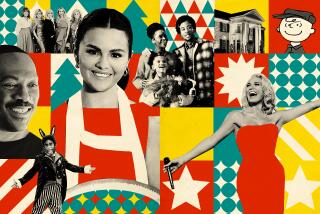CHRISTMAS THOUGHTS : Calendarâs critics share their love of the arts: the gift each would give a friend today : TELEVISION
TV plays big despite its concentrated picture.
Itâs a marketplace of noise and megatonnage, communicating in 10-gun salutes, clanging bells, electric guitars, clashing cymbals, drum rolls, mushroom clouds and gaudy, bloated, spongy, space-filling, high-pumping spectacles that wrap you up for hours at a time. So often, it chooses to equate bulk with significance, flash with value. So often--too often--it offers size for sizeâs sake.
How curious, though, that its small moments linger longest.
If I could recapture any of them as my gift to you this holiday season, two would head the list.
One is a Charles Kuralt segment from several years ago, a few unabashedly sentimental minutes of âOn the Roadâ on CBS that were so pure and loving that Iâve never forgotten them.
âComing Home,â as Kuralt titled the piece, was about the Thanksgiving reunion of the Chandler clan in tiny Prairie, Miss.
âOne after another, and from every corner of America, the cars turned into the yard,â Kuralt observed. âWith much cheering and hugging, the nine children of Alex and Mary Chandler were coming home for their parentsâ 50th wedding anniversary.â
What made the members of this black family special was not only that they were so nurturing and affectionate, but that they were so unlikely. The Chandler children were lowly underdogs, rising from the poverty of cotton fields and a sharecropperâs cabin to become college graduates with advanced degrees and impressive careers that belied their humble beginning.
They did so, Kuralt noted, âby helping themselves and helping one another.â And with encouragement from Mary and Alex, who recalled those days when he earned only 50 cents a day working for the white man.
To places like the University of Missouri, Indiana University, Morehouse College, Omaha University, Morgan State and Yale the Chandler children went, spending their summers working in the fields to help pay their way.
âYou picked cotton?â Kuralt asked. âYes, picked cotton, and pulled corn, stripped millet, dug potatoes,â said Princess Chandler Norman, a teacher in Gary, Ind., with a masterâs degree.
Scenes of the Chandlers working, eating and praying together again, supported by Kuraltâs clean narration, produced a quiet, simple, piercing eloquence, with pictures and words in rare perfect harmony.
âThere are probably no lessons in any of this,â Kuralt concluded about the Chandlers, âbut I know that in the future whenever I hear that the family is a dying institution, Iâll think of them. Whenever I hear anything in America is impossible, Iâll think of them.â
I thought of them this week, and called Prairie to see if much had changed. No, said 77-year-old Mary, except that Princess died in September of cancer at age 55, leaving four children. So the familyâs latest reunion was a sad one, a funeral in Gary.
Everyone is still close. âWeâre close for spiritual reasons,â Mary said, âand from working together and playing together.â
The Chandlers were a hopeful moment in TVâs infinity that suggested how much we can gain from each other. It was ABC News correspondent Marshall Frady in âThe Fire Unleashed,â his 1985 documentary about the global threat of nuclear weaponry, whose ending words suggested more potently than any I had ever heard, just how much all of us have to lose.
Frady spoke bluntly, yet softly and unemotionally except for a hint of sadness in his Southern voice:
âOver the great reaches of cosmic time we have existed here for only a moment, creating against the void around us an urgent and tumultuous pageant.
âNow we are faced with our end.
âThere would then be no more struggle, anot even weeping . . . no more passion . . . no more courage . . . no more forgiveness . . . no more love.
âAll vanished with us like a dream, no memory even that we labored and dared once, that we made beauty, discovered care and honor.
âNo memory even that we were --one marvelous glint of knowing in the eternal night of the universe.â
It is here where the roads of Charles Kuralt and Marshall Frady meet, one man celebrating goodness and humanity, the other issuing a dark message about a destructive force that in one instant could wipe them away.
Moments to consider through the holidays.
More to Read
The complete guide to home viewing
Get Screen Gab for everything about the TV shows and streaming movies everyoneâs talking about.
You may occasionally receive promotional content from the Los Angeles Times.






